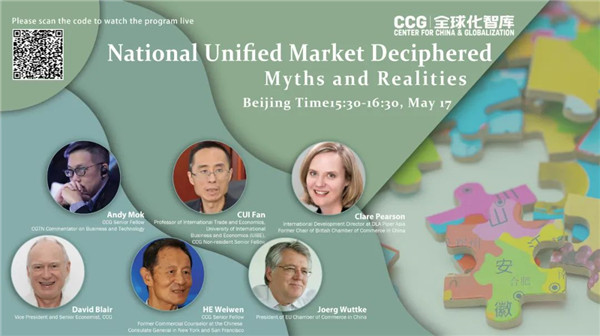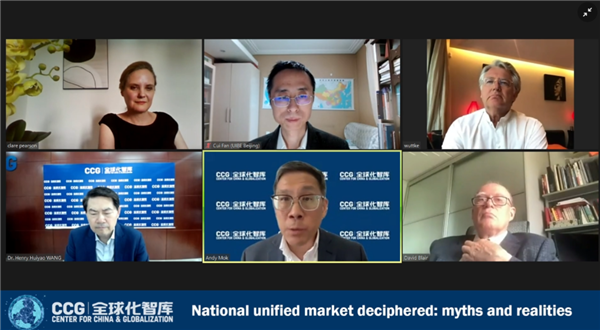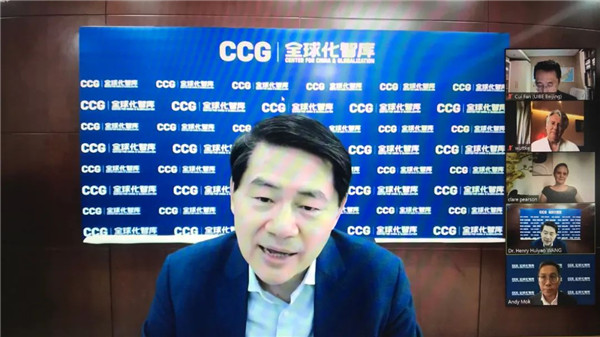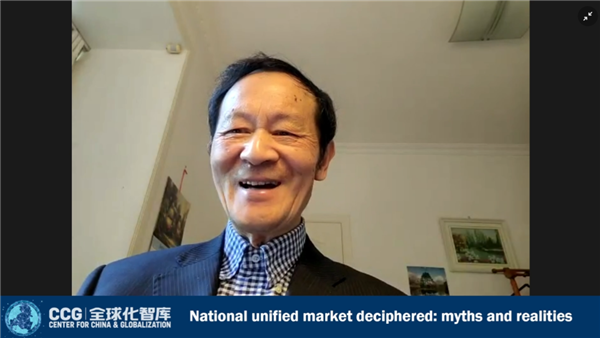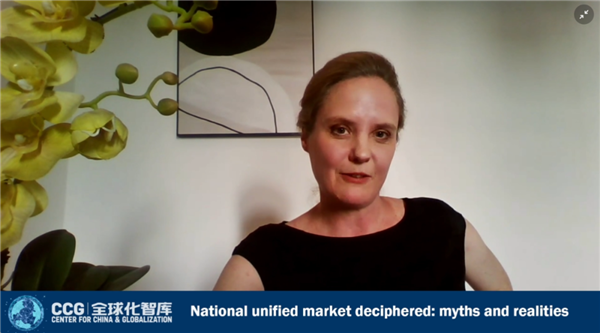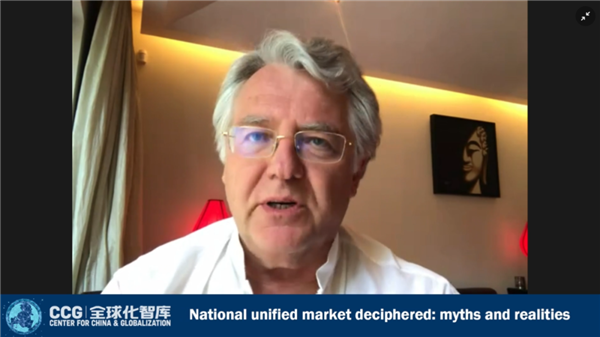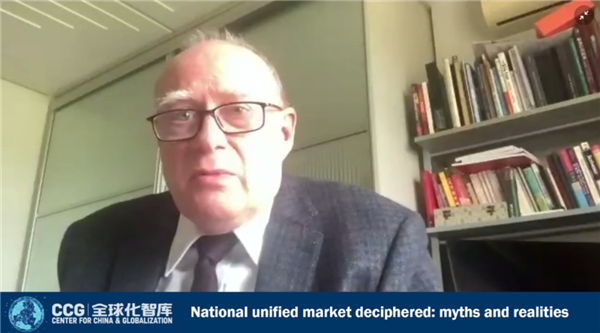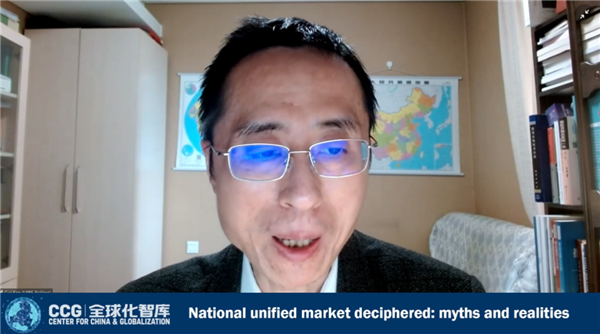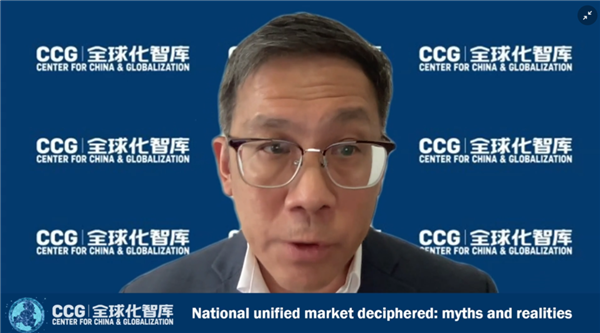The “National Unified Market” Deciphered
May 17 , 2022[English Video]
Recently, CCG hosted a seminar focusing on the Opinions on Accelerating the Construction of the National Unified Market which was recently jointly released by the CPC Central Committee and the State Council. While it quickly attracted attention inside and outside China, it also resulted in some confusion and concern. This prompted CCG to gather experts from a range of fields to discuss the impact this new policy might have on business in China as well as potential challenges and opportunities for global companies. CCG Senior Fellow Andy Mok moderated the discussion.
Wang Huiyao, CCG President started the discussion by highlighting the clear importance of the document. China has 34 provinces and protectionism is a huge problem in a fragmented market landscape. It is important that we work to increase market efficience, break down barriers and promote trade flow. The pandemic has created huge challenges for companies around the world, but this is temporary and the government is trying hard to maintain the balance between the economic development and controlling of the pandemic. The Opinions is a significant step toward driving more economic development and CCG is pleased to provide a platform for experts to share and exchange their views on this policy at such a critical juncture.
HE Weiwen, CCG Senior Fellow, former Commercial Counselor at the Chinese Consulates in New York and San Francisco, explained that the “national unified market” is not a new concept. Premier Li Keqiang previously introduced the concept in 2015, but the policy is even more important now. The application of a unified national market policy will considerably reduce logistics costs, increase productivity, and drive market demand, enabling the Chinese economy to scale-up. It does not mean China is closing off its economy, but rather that it will further open and to integrate with global market, promoting comparable regulations and fair competition both in China and the rest of the world.
Clare Pearson, International Development Director at DLA Piper Asia, former Chair of British Chamber of Commerce in China said that borders are inevitably places where businesses lose efficiency and slow down and the national unified market will allow companies to easily access new people and markets. Foreign companies should not come to China for cheap labor but for its talented and productive workforce. This policy is very exciting for many foreign companies because it has the great possibility to catalyze economic development in the future.
Joerg Wuttke, President, EU Chamber of Commerce in China said that the market in China is more fragmented than ever because of the supply chain constraints and Covid issues that many companies are facing. Now a mechanism must be found that can generate growth. The European Union has endeavored to make the EU a unified market through a unified passport and currency, but it remains fragmented. Many foreign companies are in favor of a stronger system in which the centralized laws are applied and local governments must follow them. In a unified national market, foreign companies can expect easier market access and a breakdown of regional barriers.
David Blair, Vice President and Senior Economist, CCG said that if China’s economy can continue to grow, China would become a key player in the global politics and economy. The crucial issue is to do the right thing to maintain growth. Opening a national market can promote local competition and increase the real income of local people. Britain, Spain, and the United States have all tried similar methods, but in the process of eliminating local monopolies, people should be aware of the creation of a national monopoly. A stable transition in building of a unified national market is also very important. If the government intervenes too quickly, many local companies may not have enough time to adapt.
CUI Fan, Professor of International Trade and Economics, University of International Business and Economics (UIBE), CCG Non-resident Senior Fellow said that, for large-scale industries, China’s massive domestic market will become the source of international competitiveness. Many innovation-oriented companies will also benefit from a scaled economy. In the process of creating a “national unified market”, improving policies on competition and the rule by law is very important in balancing the national market with the uniqueness of local development.
Andy Mok, CCG Senior Fellow, closed the discussion by thanking panelists for their both honest and optimistic views on the “national unified market”, adding that in the context of China’s “dual circulation” strategy, the creation of a “national unified market” will benefit both foreign and Chinese businesses and it should be seen as a part of the “dual circulation” strategy.
As the world explores a way forward in the post-pandemic era, policies like this will provide opportunities for a broader participation by the world in China’s own recovery. The “unified national market” gives us a new way of thinking about production, in terms of geography, but also in terms of labor, capital and data. Digital currency may also play a very important role in the construction of a unified national market.
About CCG
One of the world’s top100 non-governmental think tanks, CCG has been closely following global trends and dedicated in the study of globalization, global governance, international relations and so on. CCG has been granted the official special consultative status by the Economic and Social Council of the United Nations (ECOSOC) as a non-governmental organization.
